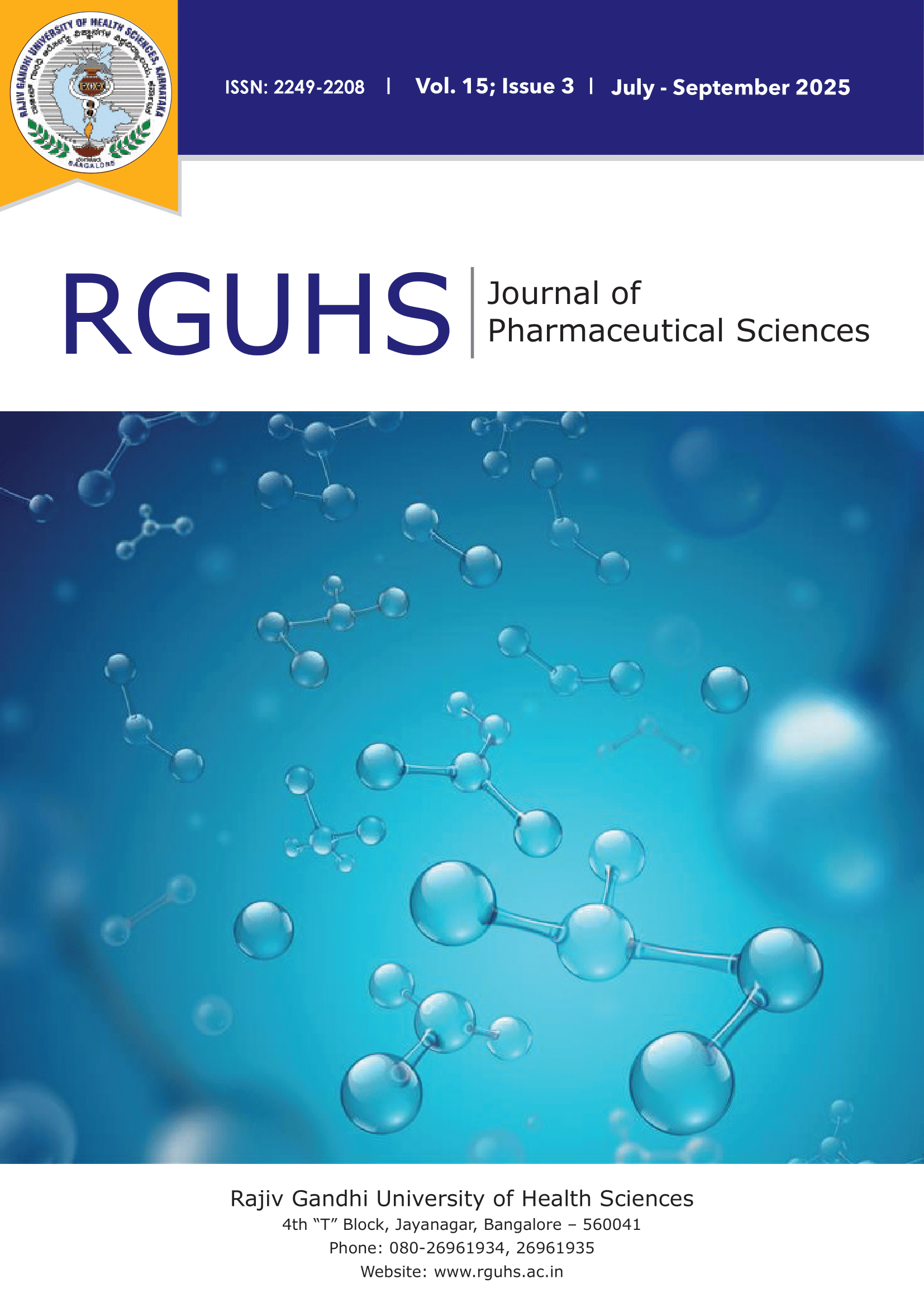
RJPS Vol No: 15 Issue No: 3 eISSN: pISSN:2249-2208
Dear Authors,
We invite you to watch this comprehensive video guide on the process of submitting your article online. This video will provide you with step-by-step instructions to ensure a smooth and successful submission.
Thank you for your attention and cooperation.
Dr.Nitin Mahurkar
M.Pharm.Ph.D., EDPCM.
Editor-in-Chief, RJPS
Prof. and HOD Pharmacology
Professor-in-charge Pharma-D
HKES’s Matoshree Taradevi Rampure Inst.of Pharm.Sc.
Sedam Road, Kalaburagi-585 105 (K.S.)
E-mail: allnitin@yahoo.co.in
Cell: +919945835706; 9110273736

Abstract
None
Keywords
Downloads
-
1FullTextPDF
Article
I have great honour of placing before you the Vol 9, issue 2 of RJPS. Plastic-the devil……we consume it……and then it consumes us!
It is high time we say good bye to plastic at least wherever possible at all levels. It may be individual needs in the form of polythene bags, or food containers, toys to societal needs as plastic pipes, furniture, kitchenettes, TV, AC, electrical, electronic and all other such appliances. This article is not intended to count the advantages of plastic that we all are aware Viz., cost, disposability/reusability, weight etc., but only to highlight the irreversible damage caused by it.
Kudos to our honorable Prime Minister Sri Narendra Modiji for taking up this Himalayan task after the Swachh Bharath Abhiyan on a war footing.
Modern day man has drifted away from our ancestral value based holistic living by considering it as redundant or vogue practice. The earthen pots, brass/copper water bottles or even the vegetable shells carried as water bottles by the poor (which in fact are more attractive!) were value based and devoid of risk of toxicities. Foods packed in plastic/aluminium foils are not only problematic to us but are problematic to other living beings including so called nonliving entities Viz., cattle, birds and aquatic life and rivers (Ganges, Nile enjoy the living status). The eco friendly plantain leaves, butea leaves (muttuga in kannada), lotus, betel, almond leaves (earthen plates too are used) that are used even today traditionally are not only biodegradable but consumed as food by the cattle and were time-tested means. Cotton/jute cloth bags for carrying items were safe methods of healthy lifestyle. With the introduction of plastic items, the entire world is facing the menace of plastic garbage as they are meant for single use/ disposable purpose. Today the big challenge before us is how to manage or destroy them which has a life of more than 500 years for degradation. About 350 million tons of plastic is produced each year in the world and in last 60- 70 years, about 6.3 billion tons of plastic has been produced out of which only about 10% is recycled, about 1% incinerated and remaining is lying as garbage.
Various governmental and nongovernmental agencies have taken up the task of sensitizing the society against the use of plastic and its possible untoward effects. The earthen pots that were used for cooking or storing of grains, for storing water and for drinking water/milk etc., were the safest for individuals as well as for environment as they can be sent freely and safely back to the nature after single or multiple use. The catastrophic effect of plastic is a classic example that has ruined not only the lives of human beings, animals, but has polluted wells, rivers and oceans and has created toxic artificial mountains. Birds swallow the bottle caps mistaking it for prey/ food, cattle swallow plastic bags along with food placed in them or along with grass while grazing. Besides, fish, turtles, whales and all the aquatic creatures have become victims of plastic consumption.
It is believed by scientists that more than half of the world’s population might have plastic passing through their bodies. Human beings may pass 800-1000 plastic pieces in the feces per day. Plastic in fish has been reported to cause inflammation and physical damage as it can deposit in organs. The micromolecules can cause damage to the organs not only by physical friction but by the presence of chemicals that leach out, colorants and other additives along with it. They can cause cancer, birth defects, impaired immunity, genetic defects, bronchitis, skin diseases, endocrine disruption etc.The bisphanols, phthalates are cancer causing chemicals present in plastics. Scientifically we test all the drugs in animals like rats/mice/guinea pigs/fish etc., and extend the results to human beings. Thus going by these standards they will definitely cause untoward effects on human beings too. At this stage we all are like guinea pigs who are undergoing an undictated experiment wherein, we are consuming the plastic (short term/long term) and waiting for the day to provide data to the future scientists about the plastic consumption and its ill effects!
Before it is too late, every individual should become a responsible citizen and sensitize others who are unaware of this tragedy. Total elimination of plastic may be a distant dream till alternatives are invented, but definitely we can minimize its use in our daily lives at all avoidable stages Viz., carry bags, plastic bottles, plastic spoons, plastic plates, plastic containers at home as well while carrying food during journeys, plastic cups, plastic jars for storing water etc.
Let the glorious era of healthy living be enjoyed by all the human beings and automatically it extends to all.
Supporting File
References
None